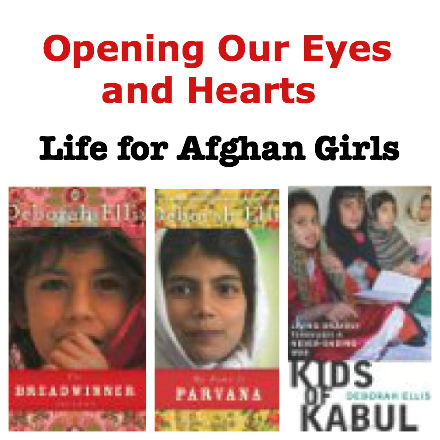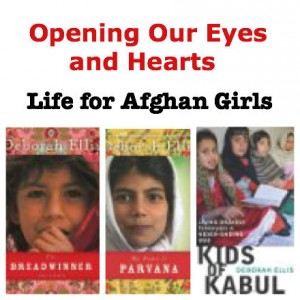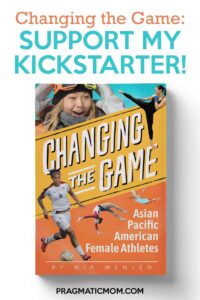Why We Need to Teach Our Kids About Afghanistan
It’s hard for me to imagine what it is like to grow up as a girl in Afghanistan. For my daughters, life there is unimaginably different from their own experience growing up in a suburb of Boston. Girls not allowed to attend school? Yes, my daughters, that still exists in the world.
Under Taliban rule, fewer than 50,000 girls attended school in Afghanistan. Today, 3.2 million attend.
But not without a price…
A day in the life of an Afghan school for girls
Under Taliban rule, fewer than 50,000 girls were in school. Today, 3.2 million attend. Two sessions a day are needed to accommodate all the students.
There is no electricity in the building, leaving hallways dark and some classrooms quite dim, yet pupils seem enthusiastic to learn. Occasionally the girls go outside to the water pump to get a drink of water or wash their hands.
Compared with other Afghan schools, Speena Adi is relatively well staffed. Even as more children come to school, many challenges remain: overcrowding; inadequate teacher pay; a paucity of school supplies; and, most distressing, hundreds of incidents of violence against schools, teachers, and even students by Taliban agents. from The Christian Science Monitor
I am indebted to Deborah Ellis’ Parvana series for educating me on modern life in Afghanistan. I had heard that anyone who dared teach girls became a target marked for death by the Taliban.
The Breadwinner Trilogy
The Breadwinner, set in Afghanistan, takes us on 11-year-old Parvana journey. She lives with her family in a bombed-out apartment building in Kabul. When her father is arrested for the crime of having a foreign education, the family is left with no money or resources. Forbidden to earn money as a girl, Parvana must transform herself into a boy and become the breadwinner.
In Parvana’s Journey, her father has died and the family has scattered. Parvana, now 13 years old, is determined to find them. Again masquerading as a boy, she joins a group of wandering children, all refugees from war, who exist mainly on courage.
In Mud City, the focus shifts to 14-year-old Shauzia, who lives in the Widows’ Compound in Pakistan and dreams of escaping to a new life in France. Deborah Ellis uses simple, compelling language, memorable characters, and a wealth of imaginative detail in this wrenching look at the human cost of war that is also a surprisingly hopeful story of survival.
It’s easy to forget that the United States is at war in the Middle East. For my kids as well, they have no idea who the “enemy” is. While they have some images of 9/11, this world is far, far away.
What I like about this series is that it humanizes us, the reader. The victims in a war are children around the same age as the target audience. Imagine a 6th grader forced to support her family. Imagine a world of endless war. Books have the ability to transport us and to make us better humans. This is one of those powerful series with that capacity, difficult though it is to learn about life in a war zone fraught with danger and know that this is reality.
My Name is Parvana
On a military base in post-Taliban Afghanistan, American authorities have just imprisoned a teenaged girl found in a bombed-out school. The army major thinks she may be a terrorist working with the Taliban. The girl does not respond to questions in any language and remains silent, even when she is threatened, harassed and mistreated over several days. The only clue to her identity is a tattered shoulder bag containing papers that refer to people named Shauzia, Nooria, Leila, Asif, Hassan — and Parvana.
In this long-awaited sequel to The Breadwinner Trilogy, Parvana is now fifteen years old. As she waits for foreign military forces to determine her fate, she remembers the past four years of her life. Reunited with her mother and sisters, she has been living in a village where her mother has finally managed to open a school for girls. But even though the Taliban has been driven from the government, the country is still at war, and many continue to view the education and freedom of girls and women with suspicion and fear.
As her family settles into the routine of running the school, Parvana, a bit to her surprise, finds herself restless and bored. She even thinks of running away. But when local men threaten the school and her family, she must draw on every ounce of bravery and resilience she possesses to survive the disaster that kills her mother, destroys the school, and puts her own life in jeopardy.
A riveting page-turner, Deborah Ellis’s new novel is at once harrowing, inspiring and thought-provoking. And, yes, in the end, Parvana is reunited with her childhood friend, Shauzia.
Are there any “good guys” in a war? Are the Americans in Afghanistan part of the violence that touches civilians including children? Parvana’s story continues as she is captured by American forces and identified as a suspect. Just 15-years-old, Parvana has endured a lifetime of tragedy and violence.
Kids of Kabul: Living Bravely Through a Never-Ending War
Since its publication in 2000, hundreds of thousands of children all over the world have read and loved The Breadwinner. By reading the story of eleven-year-old Parvana and her struggles living under the terror of the Taliban, young readers came to know the plight of children in Afghanistan.
But what has happened to Afghanistan’s children since the fall of the Taliban in 2001? In 2011, Deborah Ellis went to Kabul to find out. She interviewed children who spoke about their lives now. They are still living in a country torn apart by war. Violence and oppression still exist, particularly affecting the lives of girls, but the kids are weathering their lives with courage and optimism: “I was incredibly impressed by the sense of urgency these kids have — needing to get as much education and life experience and fun as they can, because they never know when the boom is going to be lowered on them again.”
The two dozen or so children featured in the book range in age from ten to seventeen. Many are girls Deb met through projects funded by Canadian Women for Women in Afghanistan, the organization that is supported by royalties from The Breadwinner Trilogy. Parvana’s Fund provides grants towards education projects for Afghan women and children, including schools, libraries and literacy programs.
All royalties from the sale of Kids of Kabul will also go to Women for Women in Afghanistan.
p.s. More on Deborah Ellis
Deborah Ellis is a Breadwinner for Afghan women
p.p.s. If you want to help, here are some non-profit organizations focusing on helping Afghan children:
Help the Afghan Children
The Linda Norgrove Foundation
World Vision
To examine any of the items listed, please click on image of item. As an Amazon Associate, I earn from qualifying purchases.
p.s. Arab American Book Lists for Kids
16 Wonderful Ramadan Books for Kids of All Ages
18 Wonderful Picture Books about the Arab World
This is my collection of the best picture books I’ve read so far about the Arab world.
27 Books for Kids About the Arab World
Top 10: Middle Eastern American Children’s Books
Middle East Outreach Council Award
How To: Teach Your Children About Islam (and tolerance in the process!)
In the wake of the conflicts in the Middle East, I thought it especially important for kids to learn about Islam and the people of the Middle East which might also teach them tolerance in the process. There is so much negative stereotyping during a war that can color a child’s perspective.
Deborah Ellis’s Parvana series shows a realistic view of what life is like in Afghanistan for girls today. It’s heartbreaking but also so important.
The Pharoah’s Secret at Boston’s Museum of Fine Arts
Chapter book The Pharoah’s Secret by Marissa Moss discovered in Boston’s Museum of Fine Arts. Did I find Senenmut, Hatshepsut’s love there?!

To examine any of the items listed, please click on image of item. As an Amazon Associate, I earn from qualifying purchases.
BEST #OWNVOICES CHILDREN’S BOOKS: My Favorite Diversity Books for Kids Ages 1-12 is a book that I created to highlight books written by authors who share the same marginalized identity as the characters in their books.































Thanks for sharing these books. I agree that this kind of global awareness is critical for children.
Hi Maryanne,
It’s difficult to read about kids suffering but it does humanize war and the Afghan people that otherwise get portrayed in an exaggerated way that makes us look like the “good” guys and them as “bad” guys but it’s not really that simple.
I would really like to read these, thsnks for sharing. Though I do squirm at horrible things happening. I hate catching headlines these days.
Hi Catherine,
I am also a squirmer of horrible things; it can give me actual nightmares so I do it gingerly but I do think it’s so important for us, as Americans, to understand the Middle East, particularly countries where we’ve been at war. The girls, women and children are all victims of this terrible war though the Taliban have been oppressing women for a long time. I also just want my kids to realize that the country we are at war with has kids and women suffering who are not “the enemy” or the “bad people.”
I did read a National Geographic article not to long ago on child brides in Afghanistan. Very upsetting.
Definitely want to check out the Breadwinner. Thanks for the recommendation!
Hi Ann,
There are so many upsetting issues in Afghanistan. I totally agree that child brides are a horrifying thought yet are a common practice. I wonder how quickly things can change … for the better or for the worse. The people there have had such decades of conflict. We only know Afghanistan through the food. There are two really good restaurants in Boston and Cambridge that specialize in Afghan food and it is wonderful.
These books sound very thought provoking and interesting.
Hi Gina,
The books are eye opening and very realistic. To learn that the world around us can be such a harsh world for girls is disturbing but important for kids to realize. But I would wait until the reader is ready to learn such a message. Maybe middle school is a good age.
Thank you so much for sharing the links! The research that you did about the books and the current conditions in Afghanistan is really impressive (I’m Indian, by the way!)
Hi Roshni,
Thanks so much! I’m so glad you found the information on the state of girls in Afghanistan useful and I’m heartened that it’s slowly improving over there.
Thanks for bringing this to everyone’s attention. I especially appreciate that you included links to relevant to non-profits we can contact (I wish newspaper articles did that on a regular basis).
Hi Mrs. Brown,
You are so welcome! Thanks so much for visiting my blog!
A much needed subject I think I’ll have my children read. It’s so easy for kids today to realize how fortunate they are to live in a democracy and, for our girls, to understand how there still exists cultures that strive to clamp down on girls’ ambitions and dreams. Thank you.
Posted by Catherine Stratton
From my LinkedIn Group Harvard University Alumni
I know what you mean. It’s eye opening that lives for girls can be so different in one country versus another in this day and age!